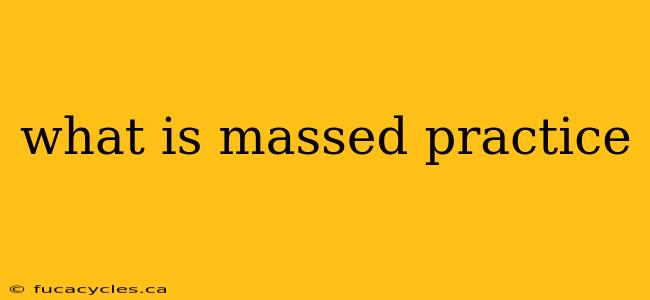Massed practice, also known as blocked practice, is a learning strategy where you focus on a single skill or task repeatedly for an extended period, with minimal breaks in between. This contrasts with distributed practice, which involves spacing out learning sessions over time. Understanding the nuances of massed practice is key to optimizing your learning and skill development.
Understanding the Mechanics of Massed Practice
Imagine practicing free throws for an hour straight, with only short pauses for water. That's massed practice in action. You're dedicating a significant block of time to repetitive engagement with the same skill. The core principle is concentrated, sustained effort.
Key Characteristics of Massed Practice:
- Repetitive drills: Massed practice emphasizes repetition. The same skill or task is performed again and again.
- Short breaks: Breaks are short, if present at all. The focus is on maintaining a consistent rhythm of practice.
- Intense focus: The learner maintains a high level of concentration during the session.
- Potential for fatigue: Because of its intense nature, massed practice can lead to physical and mental fatigue.
When is Massed Practice Effective?
While not always the optimal approach, massed practice shines in specific situations:
- Developing initial automaticity: For simple motor skills, like typing a specific sequence, massed practice can quickly build muscle memory.
- Building foundational knowledge: When learning basic facts or concepts, repetitive exposure can reinforce understanding.
- Short-term performance boosts: If you need to perform a skill immediately after training (e.g., a quick quiz), massed practice might yield better immediate results than distributed practice.
- High motivation and focus: Massed practice is most effective when you are highly motivated and can maintain concentration throughout the session.
Limitations of Massed Practice:
Massed practice's effectiveness isn't universal. Several drawbacks limit its broader applicability:
- Fatigue and burnout: The intense focus can lead to mental and physical exhaustion, reducing the quality of practice and hindering long-term retention.
- Reduced learning efficiency: While initially providing a sense of rapid progress, massed practice often results in lower overall learning gains over the long term compared to distributed practice. This is because spaced repetition improves memory consolidation.
- Interference effects: Repetitive practice of a single skill can sometimes interfere with the learning of other related skills.
- Not ideal for complex tasks: Massed practice is generally less effective for complex skills requiring deep understanding and problem-solving. Complex tasks benefit more from spaced repetition and deliberate practice.
Massed Practice vs. Distributed Practice: A Comparison
The choice between massed and distributed practice depends heavily on the task, individual learning style, and time constraints.
| Feature | Massed Practice | Distributed Practice |
|---|---|---|
| Practice Sessions | Long, continuous sessions with minimal breaks | Shorter sessions spread out over time |
| Time Efficiency | Appears efficient initially; less so long-term | Less efficient initially; more efficient long-term |
| Retention | Lower long-term retention | Higher long-term retention |
| Fatigue | Higher risk of fatigue and burnout | Lower risk of fatigue and burnout |
| Optimal for | Simple motor skills, quick performance boosts | Complex skills, long-term learning |
How to Use Massed Practice Effectively
Even with its limitations, massed practice can be useful if employed strategically:
- Short bursts: Break down long practice sessions into shorter, focused intervals with short rest periods. This can help mitigate fatigue.
- Active recall: Regularly test yourself on the material to reinforce learning and identify weak areas.
- Vary your practice: Include variations within the massed practice to avoid complete monotony.
- Prioritize quality over quantity: Focus on accurate and deliberate practice rather than simply completing a high number of repetitions.
- Listen to your body: If you feel fatigued, take a break. Pushing through exhaustion will likely be counterproductive.
Conclusion: Finding the Right Balance
Massed practice, while having a place in certain learning contexts, is not a one-size-fits-all solution. Distributed practice generally leads to more efficient and longer-lasting learning. The key is understanding your learning goals, the nature of the skill or task, and your own physical and mental capacity. A balanced approach, incorporating elements of both massed and distributed practice, may often prove most effective.
